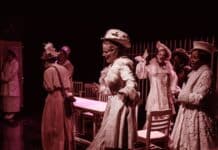Fuenteovejuna, a U.S. premiere at GALA Hispanic Theatre, is a vividly contemporary version of an enduring masterpiece. The play itself is a jewel of Spanish culture. Its author, Lope de Vega (1562–1635), was a poet, playwright, and novelist who is often compared to Shakespeare. He is known for his exceptional productivity (1,500 plays) and is considered the greatest dramatist of Spain’s Golden Age.
The adaptor, internationally known playwright Juan Mayorga, modernizes the original’s poetry while maintaining its emotional power. (David Peralto is the poetry and verse consultant.) José Luis Arellano, a Helen Hayes Award–winning director of theater, film, and television, along with his fellow artists, has created a production that honors its source but also reminds us how much the play has to say to us, here and now.

Fuenteovejuna (1612–14) is set in the 15th century, at a time when Spain was rife with conflict between the Catholic monarchs Ferdinand and Isabella and the King of Portugal. It is based on a true story — in 1476, the populace of the eponymous village rose up together against their selfish and cruel overlord, the Commander, who refused to relinquish his feudal power. Director Arellano describes the play as “a fight for justice in a cruel world.”
At first, we are in the castle convent of the Order of the Knights of Calatrava, who support the King of Portugal. The Commander (Iker Lastra) attempts to persuade the Maestre (Edwin Bernal), or Master, his superior, to join him in attacking the enemy stronghold of Cuidad Real. Lastra is a fiercely magnetic actor who holds the attention of the audience throughout. Bernal, younger but brimming with excitement, promises to “scorch its walls like a dread bolt of lightning.”
In a lovely interlude, we see our heroine, Laurencia (Julia Adun), a vision in white, singing in the Plaza of Fuente Ovejuna. Her spirit and eloquence make her one of the most appealing characters in the play, and Adun’s performance is first-rate and full of feeling.
LAURENCIA: The mounted girl rides down
to the valley of Fuente Ovejuna;
The lord with the Cross of Calatrava
Follows close behind
She hides among the trees
Ashamed and distraught
Pretending she didn’t see him
She ducks behind the branches.
“Why do you hide, lovely girl? My lynx-eyed desire
Scales walls.”
Then we are in the village of Fuente Ovejuna, which supports Ferdinand and Isabella. Laurencia decries the relentless attentions of the Commander. Her friend Pascuala (Catherine Núñez) is curious to know if Laurencia returns the affection of Frondoso (Samy Khalil), who is deeply in love with her.

Frondoso and his friend Mengo (Luis Obed) debate the nature and existence of love. Khalil extols its joy, while Mengo believes it is all based on self-interest. Unaware of their own charm, they could be any young men in Shakespeare. Already the village of Fuente Ovejuna represents the pastoral virtues of honesty and honor as opposed to the hypocrisy and selfishness of the city.
The vicious nature of the Commander reveals itself again and again. He not only attacks the women but is willing to kill Frondoso for defending Laurencia. His violence touches Obed’s Mengo and even Laurencia’s father, Mayor Esteban (Ariel Texidó). His enforcer, Flores (Luz Nicolás), enables and even imitates his behavior.
Reina (María Les Etoiles), or Queen Isabella, carefully balances the scales of justice at the end, when the true horror of the Commander’s fate is revealed.
The performances are bracingly original. Throughout the production, there are striking images — sinuous dances, confrontations, and the (interrupted) wedding of Laurencia and her lover Frondoso (Samy Khalil). The cast is exceptional not only in their individual performances but as an ensemble. And haven’t we seen these characters — all of them — in our culture or our lives?
In contrast to this grim reality, there is the presence of friendship and love — the love between Laurencia and Frondoso, the love between Laurencia and her father, and the love of the villagers for justice.
The scenic design (by Georgios Tsappas) is perfectly suited to the play and works beautifully for any number of scenes. The dark tones of the set enhance the somber mood. Jesús D. Cortés lighting, sound, and projections are extremely evocative. The costumes by Cidney Forkpah and properties by Pauline Lamb add greatly to the very real visual excitement of the piece. Special praise is warranted, too, for the score and Aldo Ortega (DJ), who makes his GALA debut.
There are so many haunting images that it is hard to pick one. Here’s an example: Fuente Ovejuna is sometimes translated as the Sheep’s Well or Sheep’s Fountain. In a stunning moment, Iker Laster as the Commander enters, surrounded by the cast. They are wearing the heads of sheep.
The question the playwright asks is this: Is it acceptable to use evil to combat evil? What do you think? It’s still worth asking.
Running Time: Two hours, with one 10-minute intermission
Fuenteovejuna plays through JMarch 2, 2025 (Thursdays through Saturdays at 8 pm and Sundays at 2 pm), at GALA Hispanic Theatre, 3333 14th Street NW, Washington, DC. Purchase tickets online. Regular tickets are $48, Thursdays and Sundays; $50, Fridays and Saturdays; $35, seniors (65+), military, and groups (10+); $25, 25 and Under. For more information, visit galatheatre.org or call (202) 234-7174.
In Spanish with English surtitles.
The play is appropriate for ages 14 and up.
The playbill for Fuenteovejuna is downloadable here (scroll down).
COVID Safety: All performances are mask-optional. See GALA’s complete COVID-19 Safety Policy.
Fuenteovejuna
By Lope de Vega
Adapted by Juan Mayorga
Directed by José Luis Arellano
English Translation by Heather McKay
U.S. Premiere
CAST
Comendador (Commander): Iker Lastra
Laurencia: Julia Adun
Flores: Luz Nicolás
Pascuala: Catherine Núñez
Mengo: Luis Obed
Frondoso: Samy Khalil
Maestre (Master): Edwin Bernal
Esteban: Ariel Texidó
Reina (Queen Isabella): María Les Etoiles
DJ: Aldo Ortega
PRODUCTION TEAM
Scenic Design: Giorgos Tsappas
Lighting, Sound, and Projection Design: Jesús D. Cortés
Costume Design: Cidney Forkpah
Properties Designer: Pauline Lamb
Poetry & Verse Consultant: David Peralto
Intimacy Choreographer: Lorraine Ressegger-Slone
Stage Manager: Cat Moreschi
Production Manager: Ilyana Rose-Dávila
Technical Director: Jon Townson
Company Manager: Camilo Montoya
SEE ALSO:
GALA Theatre to present new and modern ‘Fuenteovejuna’ (news story, January 6, 2025)



